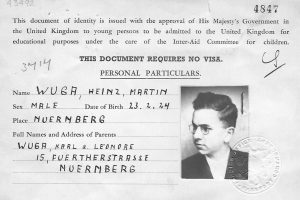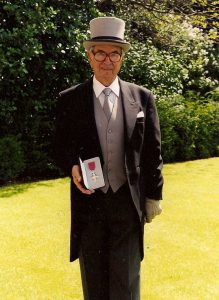
Henry Wuga MBE
Henry Wuga MBE came to Glasgow on the Kindertransport, was evacuated, then interned. He settled and married in Glasgow to a fellow Kindertransportee, gave back to the community and educated thousands on the Holocaust.
We arrived here as two penniless Jewish people and, through our work with BLESMA and fundraising for the Prince and Princess of Wales Hospice, we have been able to give something back to the country which was so welcoming to us all these years ago.
Henry Wuga was born Heinz Martin Wuga in Nuremburg, Germany in 1924 to Karl and Lore. He was an only child and describes his upbringing in ‘beautiful’ Nuremburg as normal and happy. The family enjoyed the countryside at weekends. Henry went to the local school until the age of 10.
Even before Hitler came to power Henry explains there was antisemitism. Then came the Nuremburg laws, their rights were taken away and no one would speak to him, neither students nor teachers. Henry was excluded from his school and had to move to a Jewish Grammar school where he was the year below Henry Kissinger.
The Nazis held massive rallies near Henry’s home in Nuremburg and the atmosphere was horrible. His mother knew they would have to leave so she took Henry out of school at 14, even though he loved school. She told him he needed to learn a profession as he would need to earn a living in another country. So he went to work in catering at a Kosher hotel in Baden-Baden. Then in 1938 came the November Pogrom (Kristallnacht) and his parents lost their business. They tried unsuccessfully to get to the US.

Document issued in lieu of a Visa or passport to enable the quicker transportation of Jewish children to Britain. © World Jewish Relief
Henry managed to escape the Holocaust thanks to his mother. In 1939, at the start of the Second World War, his mother managed to get Henry (who was 15 ½) on the Kindertransport. On the train, he was surrounded by crying children who didn’t know if they would see their parents again, which Henry found traumatic. He remembers the kind women in Holland who met the trains with apples and hot chocolate. A couple of days later they arrived at Liverpool Street station in London where many children met their guarantors. Henry was sent on to Glasgow, where he found a welcoming home with Mrs Eta Hurwich, a Jewish widow and refugee who came from the Baltic states in the late 1890’s. She took Henry in as her son. An intellectual lady, Mrs Hurwich took him to the theatre and musical performances and made Henry feel very much at home.
Henry had a wonderful time in Glasgow, he was sent to school and found there was no antisemitism. People were friendly to him, even though he was German and Jewish. The children gave him a friendly nickname of ‘57’ after Heinz 57 Baked Beans.
Henry was later evacuated (along with other children) from Glasgow to Perth when war broke out. Some letters which Henry sent from there to his parents (via uncles in Paris and Brussels), were intercepted by British Officials, leading to his arrest in 1940 for ‘corresponding with the enemy’. The High Court in Edinburgh declared Henry a ‘Category A Dangerous Enemy Alien’ and he spent 10 months in a series of internment camps. Some of the camps, such as Warth Mills, had shocking conditions. Later he was sent to the Isle of Man Internment Camp where he was interned with artists, musicians and academics and Henry found it a great education learning from them. Henry was eventually re-categorised and released after several tribunals. He was only 16, which was under the age for internment.
After the internment Henry started working in the catering trade back in Glasgow. He worked at a restaurant and went to the local (left wing) youth group and choir at the German and Austrian refugee centre in Glasgow. There he met his dear wife Ingrid Wolff, a fellow Kindertransportee. They learned about music and politics, marched on May Day and they performed in aid of (Mrs) Churchill’s Eastern Front for Russia.
After the war Henry and Ingrid did not want to return to Germany. Henry stayed in the restaurant trade, they married at age 20, and settled in Glasgow. After a lot of paperwork, Henry was finally able to bring his mother over to join them in 1947. She had survived the war, hidden in Germany by Catholic neighbours. His father had died of a heart attack during an air raid in 1943.
Ingrid’s parents, who had fortunately been able to follow Ingrid in leaving Germany and took up roles as domestic servants in the UK, welcomed Henry into their family. He and Ingrid cycled all over Scotland and stayed in Youth Hostels. They had 2 girls, they were very happy and eventually started a Kosher catering business which they ran for 30 years.

Henry Wuga MBE
After a successful career in the catering industry, Henry retired but gave back to the community. Henry and Ingrid gave regular talks about the Holocaust, the Association of Jewish Refugees (AJR) said of them: ‘Ingrid and Henry educated thousands of people, both young and old on the horrors of the Holocaust’. In addition, they spent 20 years fundraising for the Prince and Princess of Wales Hospice. Henry and Ingrid had wonderful holidays, loved skiing together and he worked as a ski instructor with the British Limbless Ex-Serviceman’s Association (BLESMA), teaching people with missing limbs how to ski. They did this for 28 years and Henry describes it as a ‘fantastic time with these inspirational ex-servicemen’. He was still skiing at the age of 91! Henry was awarded an MBE in 1999 for his work with disabled people.
Henry and Ingrid had a wonderful life together. When Ingrid passed away in 2020 they had two children, four grandchildren and three great-grandchildren, and had celebrated their 75th wedding anniversary. Henry sadly passed away in 2024, three weeks after his 100 birthday.


